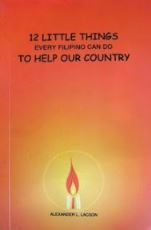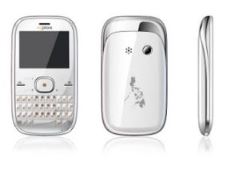I proudly call it: the BUY PINOY Experiment, where the students had to, whenever possible, exclusively use locally-made Filipino products, no imported goods allowed, for one week.
As some of you know, I am a teacher by profession. One of the subjects I teach is Literature, and here I differ from the norm in that I give more than just fiction. I often have students read books that build their character in addition to the works by the authors such as Shakespeare, Victor Hugo, and George Orwell.
So, this book is Atty. Lacson’s heartfelt effort to have us believe in our struggling country and do what we can to support it. He enumerated twelve easy steps on how to do that, hence the title.
The third chapter of the book deals with patronizing Filipino products, and it’s one of the hardest hitters for me, personally. I grew up in America during the time they had a “Buy American” campaign; and the many South Koreans who live here among us amaze me in that they refuse to patronize anything not made in their home country.
Filipinos? Well, in one of the first reflection assignments of this topic, a former student last year summed up very bluntly what is likely the mindset of her classmates, and probably of the whole nation as well: “I don’t use Filipino products to the point that I don’t even know what they are.” Now that hurts.
And it’s not just my Filipino ego that hurts. The Philippine economy hurts too. Lacson explains that when we buy an imported product, perhaps 50% of the price we pay for it goes outside the country, money that could’ve gone to our very needy people if we bought a Filipino-made product.
Of course, the main reason why we don’t patronize is we think that our products are inferior. Maybe it’s true for a good number of them, but why not support anyway and give them the funds to make their products better? Look at San Miguel Beer. Oh, we Filipinos loooooove to support THIS local product! Now, it’s hailed as one of the world’s best beers.
So here’s their project for this chapter: The BUY PINOY Experiment 2011. The students, for one whole week, had to exclusively use Filipino products whenever possible, replacing the imported products that they love oh, so much. I learned my lesson from last year and sent out a memo to the parents, asking them to buy the Pinoy goods and to be one with us in trying to instill patriotic values to their kids. When one week is over, they write an essay about their experience.
I just finished grading their essays, and was pleased with the results. Just like the first go-round last year, the students found little to no difference in quality between Pinoy products and their international counterparts. Hapee instead of Colgate was an easy switch for most. Some struggled with Magnolia butter compared to Anchor, but others didn’t see much difference. One student tried the locally made pineapple spread compared to the imported marmalade, and found the local brand much better. The Fibisco cookies were liked as much as, and some even better than, the international ones. And who doesn’t love Puto Seko?
The students struggled mightily at first, but grew to love the assignment. They now wonder why we so smugly ignore the goods we make from our own shores. Here’s what some of the students had to say:
- “Let’s stop brainwashing ourselves that just because it’s imported, it’s better.”
- “Before the week of our project, I thought, ‘Man, this is gonna be hard!’…To my surprise, nothing really changed…I barely felt a struggle…I don’t plan on stopping here. I want to continue supporting local products and buy them more often.”
- “One week of buying only local products passed by pretty fast. It was not too hard to resist the imported things and buy the Filipino products instead. Some were actually not that bad.”
- “Before this project, I underestimated and undervalued the local products of our country. Little did I know that after this project, I would see things in a different light and appreciate my country’s products more than I have ever before.
My family almost always goes to either Jollibee or Bacolod Inasal when we eat lunch after church. I vastly prefer Human Heart Nature’s organic bug spray over OFF! lotion. Our native tsokolate or sikwate drink trumps Swiss Miss, and you can probably say that with our homegrown coffees, too. Hapee toothpaste and Magnolia ice cream have been long-time products in our household. It even got to the point that I sold my phones and bought a dual-sim model from the Philippines’ first mobile phone brand, My|Phone.
My mom also followed suit, getting an even nicer model.
Hey, if we can do it, and if my privileged students can do it, then you can buy Pinoy too. Outside of the shirts with the Philippine designs on them, and our manic support for Manny Pacquiao, patriotism in this country is just about dead…or at least in the ICU. Buying Filipino products is an easy way to show our love for country. See you in Jollibee!
(For more blog articles about what goes on during my teaching adventures, click here. This blog is mostly about parenting, with a bit of Christian living and ministry, marriage, Pinoy patriotism, and others topics aimed to develop the reader’s mind, body, and soul. If you would like some good, helpful articles on these topics, I would consider it an honor if you follow or subscribe to Lessons Of A Dad. You can also go to my Facebook page here, and I’m also on Twitter at @lessonsofadad)




Hey Carlo! Good job on this project! I'm always more than a little irked when people equate anything foreign with excellence, as if nothing local is of value. We should all do our part to instill a sense of patriotism in the next generation.
ReplyDeletewhat a nice project idea. i am a teacher too, but at the college level. i will try to find ways to insert this experiment into my classes. thanks for sharing the experience. 🙂
ReplyDeleteNice article!
ReplyDeleteWe buy Pinoy products as much as possible. For dairy products, it's always Magnolia. For yoghurt, though, I alternate Hacienda Macalauan with a Spanish brand (because there is an P8 difference between this and another local brand, but the Spanish brand has a better consistency). I quit using commercial brands in favor of human nature products (pro-Philippines, pro-poor!) 2 years ago. All of my husband's biking shorts are made by a local brand well-known in the biking community (groundzero) –their products are virtually indestructible!!! There are so many ways we can help the country, but I think buying Pinoy is one of the best ways –you not only help the local economy, but you also raise awareness on Philippine brands. 🙂
Thanks for the kudos, guys! I've yet to find a list of Pinoy products out there. I don't know much beyond the brands I just mentioned. I wish there a list like that somewhere.
ReplyDeleteHello! Your project was featured on Human Nature's Facebook wall https://www.facebook.com/humanheartnature! Awesome idea.
ReplyDeleteI love this post Sir Carlo! Very interesting !
ReplyDeleteAgree! When I was in the Philippines, I was ashamed to buy Philippine-made products thinking that they are inferior to the imported ones. But now, I'm here working abroad, my Thai co-workers would tell me that I would buy them some Philippine made bags or shoes because of its superb quality. So, I have to put my head upside down for a moment for me to think it right.
ReplyDelete"Dapat talagang tangkilikin ang atin"—luv reading ur posts:)I am now following ur blog thru GFC- keep on posting and writing relevant posts:
ReplyDeleteDapat talaga tangkilikin ang gawang PINOY muna. Kaya I have MyPhone.
ReplyDeletei doff my hats to you for instilling patriotism in your students. i guess it is one virtue that is given less + less emphasis as time goes by. we ought to be raising children who loves their country, too. although i may not trade my ever-reliable phone for a myphone, i'm glad that i have magnolia fresh milk on my fridge + that i love human heart nature products, too! we are also such big fans of jollibee, much thanks to my little man! 😉
ReplyDeletevery cool and interesting stuff. I surely agree, locals should promote and buy local products as well, patronizing products internationally might jeopardize Philippine economy and marketing industries.
ReplyDeleteit is not too late to patronize our own product .. we filipinos should know the value of our own resources … Filipino First Policy should be revived
ReplyDeletesuchcool and very interesting idea! kee it up!
ReplyDeleteMInd you our product is even competitive than of the other products that came from abroad. Why I said that? Because there's this bag a native bag, it was well designed by Filipino inmates, they made that bag so they can at least earn, my friend offered it to me and ya know what it is even durable…
ReplyDeleteI agree to all we should patronize filipino goods abroad! I always do though to my in-laws 🙂
ReplyDeleteI love this article! I am advocating pro-pinoy products ever since I tried Human Heart Nature. =)
ReplyDeleteCongrats for a job well done. I really should patronize my own country's products too. I have no problem wit jollibee, happee and other things that youve mentioned
ReplyDeleteVery nice post and kudos for your idea with your students on buying local made goods.
ReplyDeleteHope this project will push through. I hope more people will support this one. Great start!
ReplyDeleteYes, we should buy more of Filipino products to help our economy and to teach our children and ourselves the pride we must have for our own.
ReplyDeletethis is a very good activity for the students. this will make them appreciate our products more. and that book will help them how to contribute to our country. great post!
ReplyDeleteCool you got the good post today. I like our products in the Phils. Hubby like our soy sauce datu puti because its low in salt then many that i can find in an Asian store that came from Pinas love to buy….It is true it will help our country..
ReplyDeleteThis is a very good idea. If each Filipino will do it, it will create a great impact. We Filipinos have been programmed to much by the media about colonial mentalitiy, it's about time to change!
ReplyDeleteAmen. Let's start with ourselves and our families.
DeleteOo nga nman! Why not?!
ReplyDeleteThank you for sharing this. May God bless you more and more. =)
ReplyDeleteVery good ideas for this project, and you can influence Filipino mindset to the fullest. Good luck!
ReplyDeleteI've read this book and I like this concept better to support Philippine Made products..
ReplyDeleteIt is always a good idea to promote local products and services of your own country.
ReplyDeleteThis is a nice project if people will do this they will start to get use to Filipino products and eventual patronize it.
ReplyDeleteDapat talagang ipromote ang sariling atin. That way we can learn to be competitive.
ReplyDeleteI would to have copies of those books. My husband and I gave up our Samsung, Sony and Blackberry mobile phones because we wanted to try Cherry Mobile (flare) and MyPhone (A919). 90% of our photos on our blog were shot using Cherry and My Phone units. 10% of which were taken using a DSLR.
ReplyDeleteActually, I now am fiercely loyal to Cherry Mobile. Why? 1. It's a product of our city, Cagayan de Oro; and 2. A dear friend made the now-famous Cherry Mobile text message tone–he passed away 2 years ago.
DeleteI buy Pinoy as much as possible. I've found that Human Nature and Ilog Maria products work better on my sensitive skin than any imported hypoallergenic soap, cream or lotion. We prefer the taste of local biscuits, snacks, chips and treats, too. There are so many great Filipino-made stuff out there, and I agree that people just need to learn more about them and give them a chance.
ReplyDeletePS I now really want to read that book. 🙂
I've read that book years ago and I like it. i actually bought 3 more to give as gift. Nice post here sir 😉
ReplyDeleteI can relate, though I live overseas, whenever I saw Philippine made products from the grocery here, I usually prefer it rather than the local counterparts. Such as our Dole Bananas and Pineapples, Safeguard, C2 etc.
ReplyDeleteGreat. I wish the pinoys here would do the same. Oh, but Safeguard is not a Pinoy product. Neither is C2, I think.
Delete